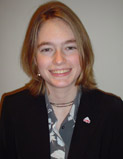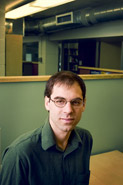In focus
Kate Rhodes: Still serving students

Arrien Weeks
If you think the McGill Alumni Association is invested solely in McGill alumni, think again. As it turns out, it also cares about current students. Just ask Kate Rhodes, alumni services associate in the student programs division.
Under Rhodes's supervision, the Alumni Association is heading a variety of programs and events committed to improving the current student experience on campus. "Alumni were all students once too, so they are very keen to help students as best they can," said Rhodes.
Rhodes herself is undoubtedly one such alumna. As former associate editor-in-chief of the McGill Tribune and president of the Students' Society of McGill University, Rhodes dedicated a great deal of her undergraduate time to fellow students. Today, she continues her devotion to the student body from her seat in the Alumni Association, heading a variety of programs and events for students.
Suppose you're an undergrad in the Department of English. You're considering a master's in journalism but remain hesitant. You have questions, but no one to ask. You have concerns, but no one to turn to. Leave it to Rhodes to pair you up with a successful McGill alumnus currently working as a journalist somewhere in the world. Rhodes is enthusiastic about the McGill Mentor Program and its ability to locate the right alumni: "If the world is six degrees of separation, McGill is two."
Now say you're part of the McGill University Electric Snowmobile Team. Power sources are expensive and you need funding for your next project. The Student Sponsorship Program is yet another program supervised by Rhodes that seeks to enrich the university experience of current students by offering funding for special student projects and events.
If you're still unconvinced as to whether the Alumni Association is looking out for existing students, consider the multitude of events offered to students and organized by the association out of the sheer goodness of its heart. Rhodes has headed such well-received events as the Exam Time Coffee Breaks and the International Students Skating Party. At the Alumni Association's next event, Rhodes will be hosting "Backpack to Briefcase," a life skills conference from March 10 to 13 in which successful McGill alumni will lead seminars and talks on real-world life lessons.
For Rhodes, the university is about the people who have passed through it rather than the buildings that contain them. She hopes that students will leave McGill with the same devotion that has kept thousands of alumni in over 90 countries still involved with their alma mater. "I didn't realize how much people loved McGill until I worked in development and alumni relations."
On the surface, Rhodes's career path may look like the culmination of a pre-planned goal that was set in her early years as a highly involved McGill student. In reality, her path has been the result of a succession of accidents and coincidences. "I fell into student politics by accident," said Rhodes. Similarly, Rhodes never actually planned to work for McGill. Yet somehow she's back, working from a new angle to improve student life on campus. "I've seen McGill from six different perspectives and they've given me this interesting - and what I know is still incomplete - perspective of how everything is working together."
Indeed, it would seem that Rhodes has become an expert on the subject she seems to like most: getting to know, appreciate and help students. "You can't go into student politics, or work for a university, without developing an expertise in communicating with students - in a real way."
- Jessica Gabe
 |
||||
|
People tend not to like crows, because they have this fiendish look to them and they're black and they like dead prey. Warblers and the birds that people tend to like are not the high innovators. |
||||
Looking for the first mammal

Computer science professor Mathieu Blanchette
Claudio Calligaris
No artefacts or fossils decorate the office of Mathieu Blanchette. No pictures from exotic archeological digs decorate his walls. His desk is devoid of any sloped-forehead skull souvenirs. Yet his research may give us a more detailed understanding of humanity's family tree than any anthropologist or paleontologist.
There is an odd duality about Blanchette's work: he uses the most high-tech tools to understand the most primitive creatures. He is a computer science professor whose office is in the Lyman Duff Medical Building.
His research uses computer algorithms to determine the functions of different parts of the human genome. One part of this project involves deducing the genetic blueprint of the ancestral creature of all mammals, including humans. This mouse-like animal would have lived roughly 75 million years ago, around the time that the dinosaurs were passing from the scene.
"The research community has sequenced a lot of genomes - the human genome in 2001, the mouse in 2002 - and there are many other mammals and vertebrates that are being sequenced now. Given that much data, what can we say about the evolutionary process that led to what we are today?" asked Blanchette.
To determine the genome of the proto-mammal, it is necessary to look at today's mammals, rather than the fossil record: "Jurassic Park does not work - no one has found a way to extract preserved DNA from fossils."
By using the genomes of modern mammals, it is possible to work backward to find DNA that is common across species. Blanchette compares the process to working with ancient manuscripts.
"Consider an ancient book, written by one author. Over the centuries it was re-written by monks who would introduce small mistakes here and there, and many different copies, were made. Today we don't really know what the original text was like, because so many errors have accumulated. We have a number of copies that don't really agree with each other, but given all the different copies we can infer the original text by using modern versions to correct each other," he said.
Figuring out the original DNA sequence uses a similar process. "Mammals are all derived from this common ancestor that we're trying to infer. They've all accumulated mutations during their evolution, but most of the time at different positions in the DNA sequence." Identify the common sections of DNA, and you might find the original genome.
It's a big project. So far, Blanchette is only looking at 2 million base pairs of over 3 billion in the genome sequence. When and if it ends, we still won't know that much about the ancestral animal. There's no way to determine what it would have looked like from its genome, though Blanchette said that at some point in the future it may be possible to synthesize parts of the genome and implant them in a mouse embryo.
The information contained in the sequence could tell us a lot about ourselves, however. By identifying sections of code that have remained relatively stable over the eons and across genomes, Blanchette said that we can more accurately identify those sections that are for core functions, on the assumption that they wouldn't change much over the years.
At the same time, it may also help us determine where on the genome, and possibly when in our evolutionary history, we developed those traits that make us human.
"For a computer scientist it's a really nice thing. Think of a cell as a small machine with very complicated behaviour, most of which is written there in the genome. If we want to understand how we work, it's all there."
 |
||||
|
I'd rather be a gyrafalcon. It lives in the northern tundra. It likes to be left alone. It's a powerful bird with a long lifespan and is highly respected. |
||||
